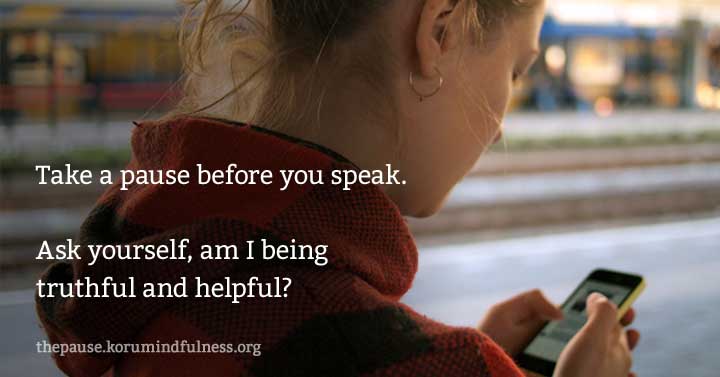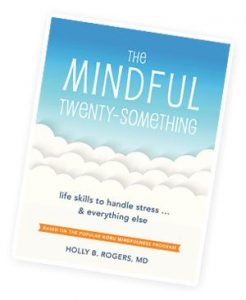
“OMG. Did I just say that?” is part 4 of our series on the traditional Eightfold Path for the cessation of suffering offered by the Buddha 2500 years ago. Missed the other posts in the series? Read them all here.
Just ask Justin Carter about the costs of letting a careless comment fly. In the midst of a heated League of Legends online game, Justin who was 18 years old at the time, made a post on Facebook that he intended to be an obvious joke. Instead it was heard as a serious threat. Justin was arrested and spent months in jail. Now 5 years later, he is facing the possibility of 8 years in prison and still waiting for his case to be resolved.
All of these things would qualify as Unskillful Speech, meaning communications that lead to unhappiness for ourselves or someone else. The Buddha was aware that our words can be incredibly destructive, which is why he made Skillful Speech one of the 8 steps on the path to the end of suffering.
What counts as Skillful Speech?
Skillful Speech is communication that is:
- Truthful – is it really honest?
- Beneficial – does it serve a helpful purpose?
- Not malicious – doesn’t intentionally create conflict or cause pain
- Timely – an exhausted friend may not be in the best place to hear feedback

If what you have to say doesn’t meet these criteria, it could be best to keep it to yourself. Does it really need to be said or texted or tweeted?
Here are a few other common slip-ups:
The humble brag.
Nobody likes a braggart. People particularly dislike a humble bragger. A humble brag is a brag disguised as a complaint. Like, “Taxes are going to kill me, I’m making so much money at my new job.” There’s even research showing that humble braggers are perceived as more irritating and less likable than complainers and traditional braggarts. Turns out it is more skillful to brag the old fashioned way.
A joke at someone’s expense.
You know how it goes, trying to be funny, you make a sarcastic comment about your friend’s new dress, and when you see it hurts her feelings, you follow it up with, “Just kidding, can’t you take a joke?” Usually these comments fly out of our mouth before we realize they sound mean. Rather than saying “kidding,” it could be more skillful to say, “I’m sorry. That was rude.”
Good old fashioned gossip.
Gossiping is a form of social bonding. Everybody does it. Though saying something bad about someone else might make you feel better about yourself for a moment, there is also a cost. One of my Koru students said in class one day:
“Since I started meditating, I’ve been paying more attention to my relationships. I noticed for the first time that my friend group just sits around and gossips about people. Once I started noticing it, it really started to bug me. We’re all so harsh. It doesn’t make me feel good.”
Remember, the point is that we all do these things. It is universal. So it is super important to not beat up on yourself when you recognize you slipped up. It’s not like you’re a bad person if you gossip or brag.
At the same time, it can improve your life if you do it less. You’ll spend less time on damage control and regret.
Your well developed mindfulness skills are like a Skillful Speech super power. Mindful awareness gives you a chance to see what you are about to say before it actually pops out of your mouth, or before you push “send.” A brief moment of awareness is often enough to give you time to hit the pause button.
 This is not easy to do, though! I’ve been practicing this for a long time, and I still screw up. Just this morning I got into a stupid debate with a friend, an unnecessary hassle for him on a day he’s not feeling great. It’s not a huge deal; but it wasn’t very skillful of me. I’ll keep working on my super power, and maybe next time I’ll catch myself a bit sooner.
This is not easy to do, though! I’ve been practicing this for a long time, and I still screw up. Just this morning I got into a stupid debate with a friend, an unnecessary hassle for him on a day he’s not feeling great. It’s not a huge deal; but it wasn’t very skillful of me. I’ll keep working on my super power, and maybe next time I’ll catch myself a bit sooner.
 One upside of Skillful Speech: it feels awesome to make someone’s day with a kind remark. I am always gifted with a great smile when I compliment a stranger or express sincere gratitude for a friendly act. It feels great. Try it and see.
One upside of Skillful Speech: it feels awesome to make someone’s day with a kind remark. I am always gifted with a great smile when I compliment a stranger or express sincere gratitude for a friendly act. It feels great. Try it and see.
Share your adventures in skillful and unskillful speech below. . I’m sure you have some good stories to share.
Photo by Daria Nepriakhina on Unsplash
Get our latest articles in your inbox.

This is such a good article! Keep it up! If you’re interested in hearing from a different perspective, the blog, The College Student’s Guide to Mastering Mindfulness is awesome! masteringmindfulnessblog.wordpress.com
Recently I was considering giving somebody a present which was kind of a joke. I planned out what my little funny speech was going to be in giving it to them. A few hours before giving it to them, I took an honest look at how the language rested in my mind that I was going to use in giving it to them. What were my motivations, what kind of emotional charge did the language have, would it truly be useful to them? In the end I decided not to give the present, primarily b/c I truly became aware of a tint of ill-will embedded in the emotional charge of the language. I treasure this moment as a confluence of right speech and right action.
Jonathan, What a lovely example of using your mindfulness super-power to detect the subtle ill-will embedded in your “gift”. You clearly have continued your mindfulness practice since graduating from Duke! So nice to hear from you.